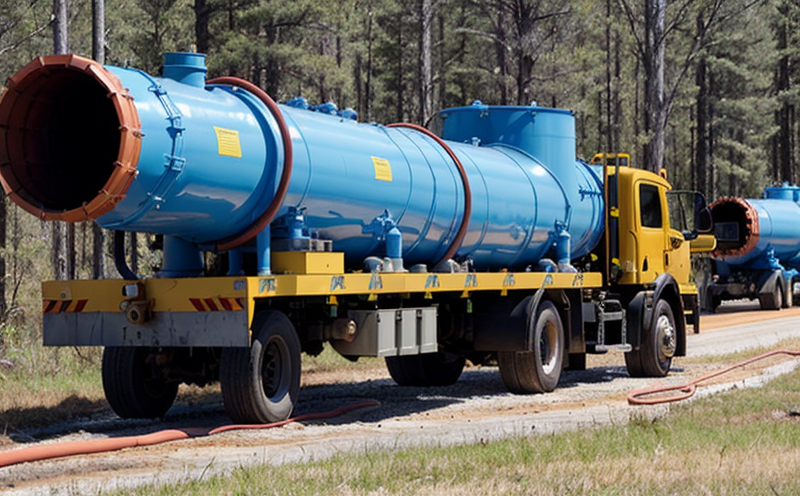ASTM B117 Salt Spray Corrosion Testing for Pipeline Coatings
The ASTM B117 standard specifies a salt spray (or salt fog) test to evaluate the resistance of protective coatings against corrosive environments. This test is particularly critical in sectors like power and utilities, where natural gas distribution pipelines are exposed to harsh environmental conditions that can lead to accelerated corrosion.
Corrosion in pipeline systems poses significant risks, including structural integrity compromise, increased maintenance costs, and potential safety hazards. By conducting ASTM B117 salt spray testing, we ensure that the protective coatings applied to these critical infrastructure components are capable of withstanding the corrosive environment they encounter during operation.
The test involves exposing coated specimens to a controlled atmosphere of sodium chloride (NaCl) aerosol. The duration and severity level determine the aggressiveness of the simulated corrosive environment. This procedure closely mimics real-world conditions, providing accurate insights into the performance of pipeline coatings under salt spray exposure.
Our laboratory adheres strictly to ASTM B117 standards to ensure reliable and consistent results. Rigorous quality control measures are in place to maintain the integrity and accuracy of our testing processes. Our skilled technicians use advanced equipment and methodologies to conduct these tests, ensuring that each sample is subjected to precise conditions that replicate actual field environments.
Understanding the importance of this test, we provide detailed reports that include not only the results but also a comprehensive analysis of the coating's performance. This helps our clients make informed decisions regarding their pipeline maintenance and upgrade strategies. By leveraging ASTM B117 salt spray testing, they can identify vulnerabilities early and implement preventive measures to enhance the longevity and safety of their infrastructure.
Our service is designed to cater specifically to quality managers, compliance officers, R&D engineers, and procurement professionals in the power and utilities sector. These individuals require accurate and actionable data from our tests to ensure that their pipeline systems remain robust and compliant with industry standards. We offer a range of services tailored to meet these needs, ensuring that every aspect of the testing process is optimized for accuracy and efficiency.
The ASTM B117 salt spray test plays a vital role in identifying potential weaknesses in protective coatings before they become critical issues on operational pipelines. By integrating this testing into their quality assurance programs, companies can enhance their pipeline safety and reduce the risk of costly repairs or replacements down the line.
Why It Matters
The durability and integrity of protective coatings on natural gas distribution pipelines are paramount to ensuring safe and efficient operations. The harsh environmental conditions, including salt spray exposure, can significantly accelerate the corrosion process in these critical infrastructure components.
ASTM B117 salt spray testing is essential for several reasons:
- Preventive Maintenance: Identifies potential weaknesses early, allowing for targeted maintenance and replacement strategies to prevent catastrophic failures.
- Safety Assurance: Ensures that the protective coatings meet stringent safety standards, reducing the risk of accidents and environmental contamination.
- Compliance: Helps companies comply with regulatory requirements set by industry bodies like the American Gas Association (AGA) and the Pipeline and Hazardous Materials Safety Administration (PHMSA).
- Economic Benefits: By minimizing corrosion-related failures, businesses can reduce maintenance costs and avoid costly downtime.
Industry Applications
The ASTM B117 salt spray test is widely used in the power and utilities sector for evaluating the performance of protective coatings on natural gas distribution pipelines. This testing ensures that these critical infrastructure components are capable of withstanding the corrosive conditions they encounter during operation.
Our service is particularly valuable to companies involved in:
- Pipeline Construction and Installation: Ensuring that coatings applied during installation meet stringent standards before the pipeline goes into service.
- Maintenance and Inspection: Identifying any signs of corrosion early, allowing for timely repairs to prevent further degradation.
- Risk Management: Assessing the effectiveness of different coating materials under various environmental conditions to mitigate risks associated with operational hazards.
- Quality Assurance: Providing reliable data that supports quality control processes and enhances overall product reliability.
Environmental and Sustainability Contributions
The ASTM B117 salt spray test contributes significantly to environmental sustainability by promoting the use of durable protective coatings that enhance the longevity and safety of natural gas distribution pipelines. This, in turn, helps reduce maintenance costs, minimize downtime, and prevent operational disruptions.
By ensuring that protective coatings are robust enough to withstand harsh environmental conditions, we contribute to a more resilient infrastructure that is less prone to corrosion-related failures. This not only enhances the safety of the natural gas distribution network but also reduces the environmental impact associated with frequent repairs or replacements.
In addition to enhancing pipeline safety and reliability, our service supports sustainable practices by:
- Minimizing Resource Waste: By identifying potential issues early, we help avoid unnecessary material usage during maintenance or replacement.
- Reducing Emissions: Reliable pipelines ensure efficient natural gas distribution, minimizing the risk of leaks and associated emissions.
- Sustaining Infrastructure Integrity: Long-lasting protective coatings contribute to the overall sustainability of critical infrastructure components.





